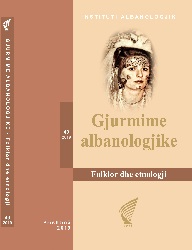NDARJA E KUJTESËS – MBI PROCESIN E TË KUJTUARIT DHE TË HARRUARIT TË LUFTËS CIVILE FINLANDEZE TË VITIT 1918
DIVIDED MEMORY – ON REMEMBERING AND FORGETTING THE 1918 FINNISH CIVIL WAR
Author(s): Ulla‐Maija PeltonenSubject(s): Civil Society, Military history, Social history, Studies in violence and power, Pre-WW I & WW I (1900 -1919), Peace and Conflict Studies
Published by: Instituti Albanologjik i Prishtinës
Keywords: 1918 Finnish Civil War; war and violence; war memories; memory of the Civil War;
Summary/Abstract: War and violence was and is a catastrophe in any person’s life. In Finland 100 years ago there were no support groups or professional advisors for victims and their families who could help them in a situation where they had lost their feeling of continuity. A bloody civil war erupted in January of 1918. The war, fought between the socialist “Reds”, mostly of working-class background, and the politically bourgeoise “Whites”. The Civil War ended in tragedy. The truth about the consequences of the War and the War itself were so painful that half a century had to pass before it was even possible to talk about the War from the point of view of the losers. The most traumatic feature of the War was that in their retaliation the victors, i.e. the Whites, caused the death of so many people. The consequences for Finnish society were harsh; some 35,000 people, of whom 28,000 were Red, died either in battle or acts of terror, 13,500 prisoners died of hunger, disease or execution, some 2,500 went missing in the war and about 82, 000 people were accused of crimes against the state, condemned to imprisonment and deprived of their civil rights for years to come. The problem is that such immense numbers easily become abstract so that their true significance becomes blurred (gloomy). Narration of the civil war, like the maintenance of silence - has been influenced by the social climate as well as the existence of both official public institutions and forums and unofficial, working-class and labour forums until the 1960s. Many different factors have influenced the processing of the difficult memory of the Civil War and this process is still underway. A dual and separate cherishing of Civil War remembrances was evident in Finland right up to the 1960s. The losers of the war, that is the Reds, were bitter, firstly, because the official truth did not admit any crimes or violence but instead covered them up or concealed them. Secondly, the official truth exaggerated and misrepresented the crimes and wrongdoings of the Reds, and even later this false information was not corrected. Thirdly, important public officials, such as clergymen, judges and teachers were biased against the Red side after the War. Fourthly, the interpretation of the war in public was such that Red supporters could not identify with it; and fifthly, Red sympathisers were not allowed to publicly display their grief by, for example, honouring their dead. Owing to these facts different frontiers of memory came to exist and prevail.
Journal: Gjurmime Albanologjike - Folklor dhe etnologji
- Issue Year: 2019
- Issue No: 49
- Page Range: 193-212
- Page Count: 20
- Language: Albanian
- Content File-PDF

